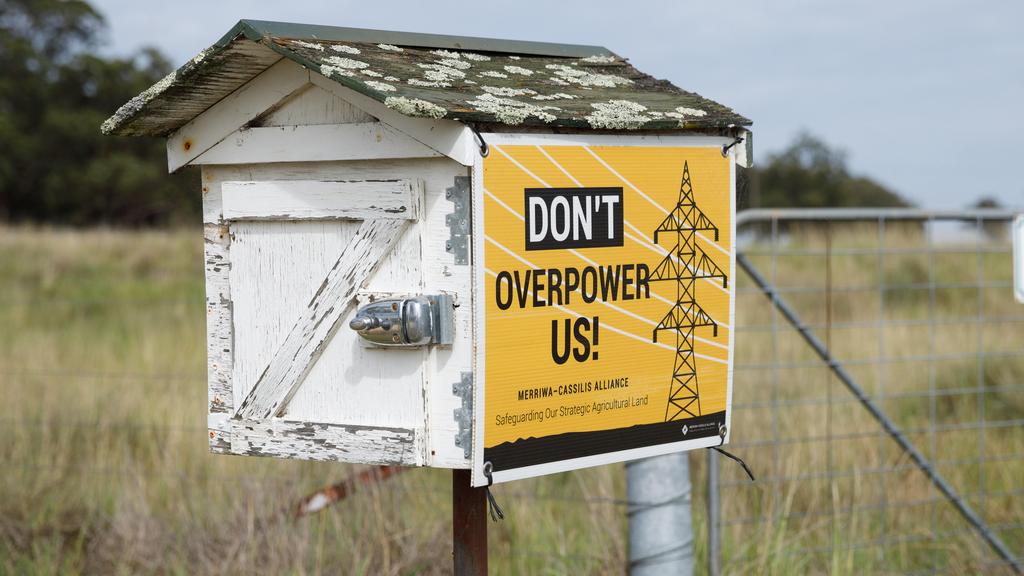
Article by Christine Middap, courtesy of The Australian
03.09.2025

If Chris Bowen took a short drive from his western Sydney electorate to the Mudgee region to the north, or Yass to the south, or just over the Blue Mountains to Oberon in the west, he might gain some understanding of the depth of community unrest about his ambitious renewables rollout.
The Climate Change and Energy Minister might like to visit Russ Erwin on his farm in Bannister, an hour from Yass, who will lose a mature native seed orchard – developed with Greening Australia – to make way for giant transmission towers Mr Erwin doesn’t want.
Mr Bowen could ask Mary-Jane Betts to take him across her property near Yass so he could see where the powerlines she is forced to host will crisscross her sheep farm, wiping out ancient trees and wildlife corridors.
Or he could visit Bill Johnson, whose plans to retire to a property on his sheep farm were cruelled by a large wind farm and substation on his boundary. Now he too is being compelled to host transmission towers.
Mr Bowen could chat to landholders near Gulgong, north of Mudgee, about their views on an accommodation camp for the 1200 workers required to build the renewable infrastructure that will soon transform this rural region.
Farmers kept in the dark over secret deals to build huge solar, wind or battery projects on neighbouring properties would have much to tell the Energy Minister. So too would a dozen or more landholder groups who are at the forefront of the wild west of planning.
Dig a little further and Mr Bowen would find towns divided, neighbours at war and real fears for social cohesion in areas that rely on unity in times of flood and fire.
If Mr Bowen were to take that drive he would quickly realise the vast majority of these hard-working Australians aren’t driven by climate change denial. They’re not funded by fossil fuel companies to spout anti-renewables disinformation, as some pro-renewables groups like to claim.
“Where a community has a legitimate concern, that needs to be worked through; they’ve got my full attention,’’ he told The Australian this week, appearing to play down the opposition to renewable projects by suggesting it’s being orchestrated by blow-ins and climate change deniers.
The howls of disbelief from affected communities would have almost carried on the breeze to Canberra on Tuesday.
The truth is, the communities slated to host these vast projects have largely been ignored by the state and federal governments.
There’s never been a genuine attempt to engage with them. Farmers are seen as obstacles to government targets and developer riches. Throw some money at them, invite them to make a complaint to some distant planning authority and expect them to go away.
Recommendations to lock in greater community support by former energy infrastructure commissioner Andrew Dyer, handed to Mr Bowen’s office in December 2023, have still not been fully implemented and the NSW government is dragging its feet on a study on the cumulative impact of multiple projects in the regions.
And then both arms of government have the temerity to blame landholders for delaying the renewables transition.
It’s not just farmers who are up in arms; councils are sounding a warning as they attempt to manage a tsunami of projects slated for their backyards. They see the benefits that could come their way in a properly planned and executed transition but right now there’s not a lot of upside.
The Central-West Orana renewable energy zone, the first dedicated REZ in NSW, has been marked by an “alarming lack of planning, leadership and co-ordination,’’ according to Mid Western Regional Council general manager Brad Cam.
This region has about 38 state-significant projects that will require an influx of about 1400 construction workers.
“The local services, housing and roads are overwhelmed,’’ he told a parliamentary inquiry. “Enough is enough.”
In the New England region, Armidale mayor Sam Coupland’s observation that regional communities are subordinate to metropolitan energy needs and an ideological race to net zero will ring true in many areas.
Mr Coupland said a recent wind farm application had sought to use 25 per cent of Armidale’s daily water usage for a two-year period. “It doesn’t take a genius to do the maths and realise that one wind farm is not feasible, let alone multiple wind farms, solar projects plus significant transmission infrastructure.”
Many people outside these regions don’t understand the scale of change under way. Residents have counted some 1000 wind towers and 10 million solar panels planned within a 50km radius of Uralla, south of Armidale.
Mr Bowen is correct that some groups and people opposing projects don’t live next to the properties hosting solar and wind farms. Some live in nearby valleys and are worried about bushfire risk; some live in other states and are worried about land-clearing of wildlife habitat. Some have an attachment to a region and don’t want the rural vistas to change. And, yes, some don’t believe in climate change or net zero targets.
“Where the neighbour objects, I take that very seriously,’’ Mr Bowen told The Australian. “But there are a lot of wind and solar proposals where the objector lives hundreds of kilometres away.”
There are lessons here from the mishandling of the Covid-19 pandemic. Just as hardline and poorly explained vaccine policies and mandates pushed immunisation supporters to question vaccination schemes and government authority, so too is the renewables rollout causing some who were fully on board to doubt the merits of the entire transition.
